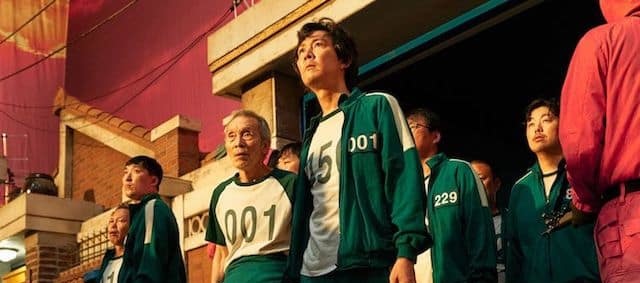
Squid Game : when Netflix tackles capitalism
Squid Game, the most recent and the biggest Netflix phenomenon, has taken the world by storm upon its release on the streaming platform this September. The theme the series deals with is an obvious and quite popular one, a criticism of capitalism – and what more unifying theme could a global audience facing peak wealth inequalities and with a shared defiance against the richest 1% ask for ?
The idea of the show Is quite a simple one; Squid Game could be viewed as the perfect mix between Bong Joon Ho’s Parasite and Kinji Fukasaku’s Battle Royale but the comparison is too reductive and fails to grasp the essence of Squid Game, or at least what makes it stand out from other similar works.
SPOILERS AHEAD
For those who (still) haven’t watched it, Squid Game is the tale of how 456 marginalised and indebted people are scouted to take part in a survival game, devised by a mysterious group of extremely wealthy people for the sole purpose of their entertainment. We follow player 456 in particular and how he will pave his way to the endgame, earning a whopping 45,6 billion won (38,5 million dollars).
The tone of the show is set from the very beginning, when we can already expect outbursts of seemingly unnecessary violence, constant splatters of blood and the omnipresent threat of dying. Another core component of Squid Game is also set from the very first episode, when our protagonist Seong Gi-hun meets Gong Yoo, the salesman in charge of playing a game of ddakji with the desperate targets and gauging their willingness to participate.
For every round Gi-hun loses, he would get slapped and if he won, he’d get a small prize of 10,000 won – in other words, how many slaps to Gi-hun’s dignity before he gives up ? As it turns out, a bruised ego only further fuelled his eagerness to win and, interestingly enough, by the time he won he wasn’t seeking money anymore but wanted “revenge”.
The outcome of this pregame mirrors the six following games; Gong Yoo (the representative of the organisers) will obviously never be slapped because he is shielded by money whereas, for the players, no amount of money will ever ease the weight of guilt, a bruised ego or a broken moral compass.
The idea behind the way the games are devised is to provide equal chances of winning to all players, unlike in the outside world where their chances of winning at life were hijacked from the very beginning. This obsession has, however, in no way guaranteed a fair game (whether because of cheating or because the games themselves were disproportionately disadvantageous to some participants). More broadly, the games are presented as an escape from a world with no hope or prospect of doing better. Spending a life of misery and being the subject of constant symbolic pain for nothing and dying in dishonour is the players’ destiny, so why not channel this symbolic violence in a more concrete way, with at least a slim chance of winning or, worst case scenario, putting an end to a wretched existence ?
The game’s logic is obviously more than flawed and doesn’t respect its core value – creating a “fair world”. Not only is the game a poor attempt at this, it is almost a cruel and tragic reproduction of the outside world where all tensions and prevailing power dynamics are the same, if not exacerbated when stripped from the mundane rules of the outside world.
Within the game, the symbolic violence of the outside becomes palpable and still shapes relationships between players. Even worse, the desperation of the players and the greed of some of them reproduces the dynamics they were victims of; this becomes even more apparent in the sixth episode, Gganbu, given that until this point all players were competing against the organisers in a sense. The shift operates when the players have to betray their most trusted partner and this is the stroke of genius of the game, which begins to chip away at Gi-hun’s perception of himself and his status as a righteous person. Ultimately, the fourth game shows that the only real way of playing isn’t sticking to the team, but playing against each other – in life as in Squid Game.
The shift unveiled in this episode culminates in the last one, “One lucky day”, where Gi-hun discovers the truth behind the game. He eventually finds out that Oh Il-nam was the one behind all of this, both a player and a VIP. The setting of this last encounter is just as interesting as the revelation itself, so much so that it could be considered as a symbolic seventh game.
Upon meeting each other for the last time, Go-hun presses Il-nam for answers and cannot comprehend the motivation behind engineering a game so foul whose bottom line is using human lives as betting objects. To prove his point, Il-nam challenges Gi-hun to one last game, a bet to determine mankind’s moral inclination : they both observe a homeless man freezing to death, waiting to see if someone’s willing to help him out of sheer kindness. And, for the sake of winning, too engrossed by the game, Gi-hun waits and risks seeing a man losing his life – just like Il-nam, for the sake of the game, let all the other players pass away.
Ultimately, Gi-hun becomes a real player and not a betting object once he bit Il-nam’s bait. The irony of it all highlights Il-nam’s feat of strength. One can wonder if Gi-hun will meet the same fate as the Front man, who was a former player and winner of the game, and ended up working under Il-nam and overseeing the game that could’ve cost him his life and that has certainly cost him his morals.
This paper was written by Amani Boughenama, a member of Streams.
